We’ve all been there. The date is over and it wasn’t a love connection.
At least . . . not for you.
But then the texts start coming in, asking to see you again. What you’re up to. What your favorite pizza topping is.
There’s something so fundamentally uncomfortable about letting someone down, even if you “let them down easy.” It’s not in our nature to reject people—especially as Christians.
But here’s an important truth: It’s okay to not be interested.
Not being romantically interested in another person doesn’t make you a monster, too picky, or mean. It just makes you human.
God created us to be with only one. Statistically that means it won’t work out with anyone else, that’s just math!
The problem isn’t not being interested, though. The main issue arises when deciding how we express that disinterest. What was once trying to come up with a nice way to say “no, thank you” has now morphed into a long pause between texts. This is became what we now call “ghosting,” or the intentional ignoring of someone until they get the picture and just stop trying.
However, shutting someone out because you’re not interested is basically saying that your social comfort is more important than their feelings.
Being honest without being mean
When it comes to changing the course of a dating relationship, there is a happy medium between the rudeness of ghosting and blunt, unnecessary honesty.
For instance, there’s no need to say to someone, “I’m not interested in you because you’re sinfully boring”. There’s also no go need to ignore them. Here are five polite, respectful ways to shift away from a romantic pursuit.
1. “I had a nice time with you the other night, but I’m just not feeling a romantic connection.”
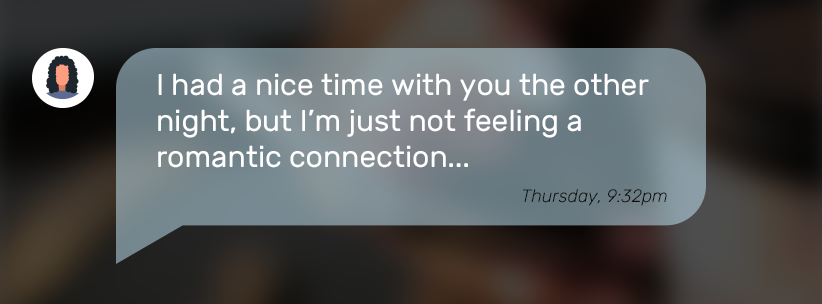
Here’s a foolproof option that works in pretty much every scenario. It’s kind and honest, without leaving room for negotiation. It is so direct it really doesn’t need much explanation!
If the date was a set up or a circumstance where you won’t or don’t want to see the person again in any capacity, this is a succinct way to close the door on anything further. However, if you want to keep the door open, keep reading!
2. “It was great to meet you, but I’d rather continue getting to know each other as friends.”
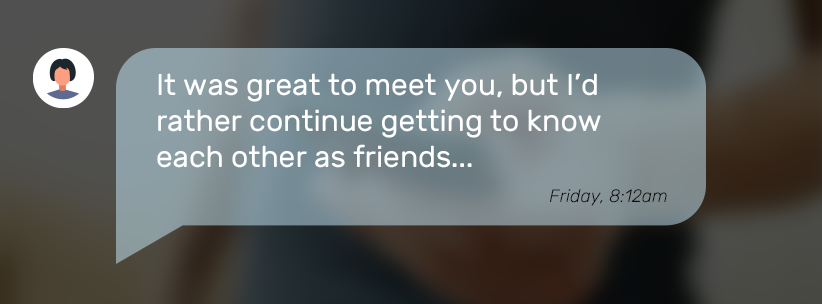
I have a friend who has a two-date-minimum policy. She needs two dates before she can accurately assess potential in a date. For me, on the other hand, I subscribe to the “when you know, you know.”
Dating can be a little out of our comfort zones. It’s tough sometimes to find a common place to start a conversation. But if it’s more work than it is fun, maybe the romance just isn’t there.
This option is great for people you’ve met in a common space. Maybe you met each other at church or fellowship community. This response won’t burn a bridge and leaves the opportunity to pursue friendship. Or at least keep you from having to dodge Bible study.
3. “I’m not interested in pursuing this further.”
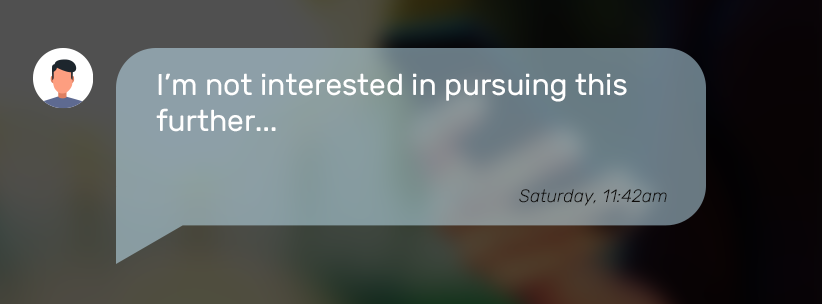
Not every date is going to be a winner. Best case scenario, you are two nice people sincerely looking for connection who just have nothing in common. But statistically, even if you’re dating with the pursuit of holiness in mind, you may come across some people who, well . . . aren’t.
There’s no need to beat around the bush or suggest friendship as an alternative. It’s a misconception that you need to over-explain your reasons for not being interested in someone. As a matter of fact, most people don’t need or want a detailed list of reasons you don’t like them. A simple and direct message like this one will suffice.
4. “Thank you for asking. I don’t want to lead you on, so I’ll be honest that I’m just not feeling a connection.”
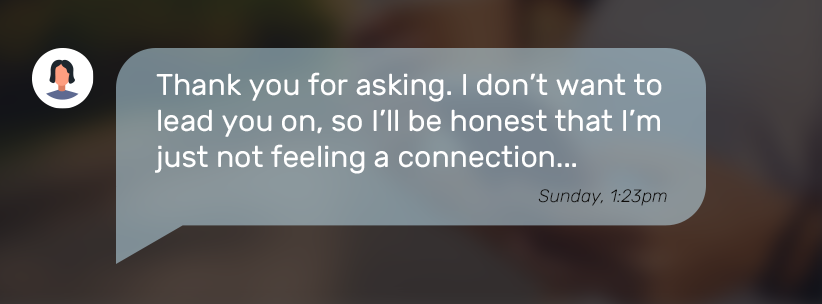
In the event that a second date is suggested immediately, this is a good answer to have ready. My personal experience was the ask for a third date. The man who took me out twice was perfectly nice. But I didn’t feel a connection to him that I was interested in pursuing.
When he asked for another date, there was no need to be unnecessarily detailed or ignore his request entirely. It was as easy as this message sent with honesty, kindness, and a genuine desire that in his quest for dating he might find the right match.
5. “I’m not sure if I want to go out again. Give me a few days to think, and I’ll get back to you.”
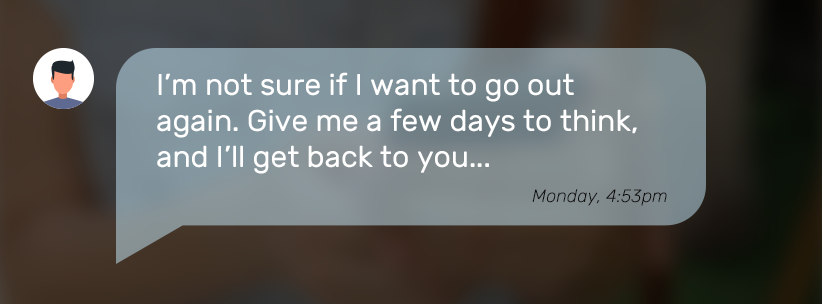
You don’t have to make a decision right away! There’s something about the digital world that really turns on the pressure for split second decision making. I work in online customer service, and people get pretty upset if we don’t address their concerns within 3 minutes after they submit it.
The need to respond instantly is backed up by a society of people who actually do respond instantly.
That’s not a prudent way to live.
Read more: 4 Things to Consider Before Going on the Second Date
Feel free to take your time before you decide if you’re ready or interested in another date. You may not feel an instant love connection but that doesn’t mean you’re not being called to cultivate something. Pray, reflect, and think about the fruits of another date before responding.
But whatever you decide, remember to still follow up!
When do I let someone down?

There’s no good time to get bad news. You can wait and chat about it when there is a follow-up. The other option is far more uncomfortable, but with immediate resolution, at the end of the date.
Face-to-face will take the most courage by far. But it will only be a few uncomfortable minutes of your life. The end of a date is also a good time to break out the “Give me a few days to think, and I’ll get back to you” line. You may not know yet how you feel, so just be upfront about that.
Is there ever a time when ghosting is a good idea?

At this point, maybe you’re wondering if there’s ever a time when it is appropriate to ghost someone. That’s your own line to find. For me, if it is bordering on harassment or someone is just not getting the message, it’s acceptable to just take a step back. Once you’ve been honest about your feelings, don’t feel like you need to keep harping on it.
More than an exact science, it’s more about the spirit of ghosting. Ignoring or dodging someone for the sake of avoiding a slightly uncomfortable interaction isn’t acknowledging the dignity of their identity in Christ.
If you’re not ready to say no to a relationship, you’re not ready to say yes, either. At its core, dating is being able to recognize the dignity of the human person, regardless of what that person can do for you. Keep that truth in mind and dating will be a much better experience, regardless how it ends!



